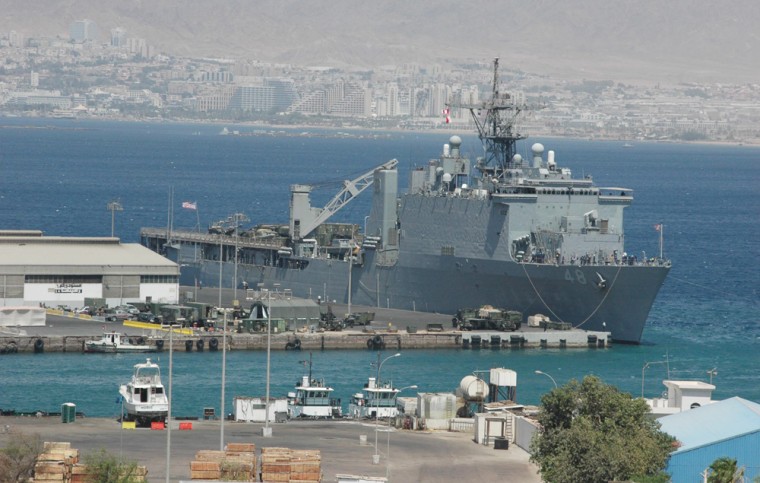Al-Qaida in Iraq said on Tuesday it was behind a failed rocket attack on U.S. Navy ships in Jordan’s Red Sea port of Aqaba, according to an Internet statement.
The group, led by Jordanian militant Abu Musab al-Zarqawi, said those who carried out the strike last Friday had fled to safety.
“Your brothers in the Al-Qaida Organization in Iraq have been planning the Aqaba raid for a while,” the group said in a statement posted on an Islamic Internet site it often uses.
“The rockets were fired at their targets -- a group of ships belonging to the crusader American forces -- in Aqaba and Eliat," the statement said.
“We would like to tell you that we delayed claiming this attack so that our brothers could complete their withdrawal ... and they returned safely to their base," it said.
Jordan has blamed the strike on an Iraq-based group, which some officials said was linked to al-Zarqawi. Three rockets fired from a warehouse missed the U.S. warships but killed a Jordanian soldier and struck the Israeli port of Eliat.
Jordanian state television said on Monday three attackers had escaped across the border into Iraq after the strike but that police had arrested a Syrian who is accused of helping them.
The government said in a statement that it had arrested a Syrian as the prime suspect in the attack.
Father, sons suspected
The government statement, read on state television, said the suspect, Mohammed Hassan Abdullah al-Sihly, plotted and carried out the attack along with two of his sons and an Iraqi.
Al-Sihly, who lives in Amman, had been surveying sites for the attack in Aqaba since Aug. 6, the statement said. He was joined by his two sons — Abdullah and Abdul-Rahman — and Mohammed Hamid Hussein, the Iraqi, in “carrying out the heinous crime,” in which three Katyusha rockets were fired from a hilltop warehouse situated on a hill above Aqaba.
Hussein was the leader of the Iraq-based group, the announcement said.
The attack was the most serious threat against the U.S. Navy since the 2000 al-Qaida bombing of the USS Cole in Yemen. It was also the first attack targeting U.S. personnel in Jordan since the October 2002 killing of an American aid worker outside his Amman home — blamed on al-Zarqawi.
Al-Zarqawi, whose group is waging a battle against U.S. and foreign forces in Iraq, has vowed to punish Jordan’s rulers for “aiding the treacherous enemy America."
The government statement said the four had rented a warehouse in Aqaba, where the rockets were mounted and connected to a timing device.
Al-Sihly’s two sons and the Iraqi — who smuggled seven rockets from Iraq in the modified gasoline tank of their Mercedes — returned to Iraq hours before the timer launched the rockets, the statement added.
“The investigation showed that the terrorist group was in constant touch with its leadership in Iraq during preparation for the attack to keep it abreast on developments,” it said.
The government said the four had chosen Aqaba as the site of the attack “considering its touristic significance and in view of the media noise it will create.”
Entering through the desert
Abdullah and Abdul-Rahman al-Sihly entered Jordan through the eastern desert border at al-Karama on Aug. 6, using forged Iraqi passports. Abdullah had been in Jordan in December 2004, for treatment of a shrapnel wound he suffered in Iraq, according to the statement.
Shortly after the announcement, Aqaba residents went into the streets to celebrate the arrest of the Syrian suspect. The television showed pictures of motorists honking horns, people ululating, dancing, and waving the Jordanian flag and pictures of Jordan’s ruler, King Abdullah II.
A Jordanian security official said earlier that four rockets the attackers left behind at the warehouse were similar those used by insurgents against U.S. troops in Iraq.
Authorities believe the unfired rockets were intended for other Aqaba targets. At least one rocket launcher and other unspecified weapons also were found in the warehouse, whose owner has been arrested, the official said, speaking on condition of anonymity because he was not authorized to speak to the press.
In recent months, Jordan has received several warnings that Aqaba was a primary al-Qaida target, the official said.
Key sites in the resort city include a beach-front compound of palaces — one a vacation house for King Abdullah — and a chain of international hotels frequented by American troops and others on leave from Iraq.
Jordan a target in the past
Jordan, a key U.S. ally that signed a peace treaty with Israel in 1994, has been the target of several failed al-Qaida plots. Thirteen men — including al-Zarqawi and three other fugitives — are on trial for an alleged al-Qaida-linked plot to attack Jordan with chemicals. The plot was foiled in April 2004.
The United States is being kept abreast of developments in the investigation, a security official said, also speaking on condition of anonymity because he was not authorized to talk to the press. The U.S. Embassy in Amman declined comment.
Hours after the attack, the embassy warned American government personnel against traveling to Aqaba and told other U.S. citizens to “exercise caution.”
